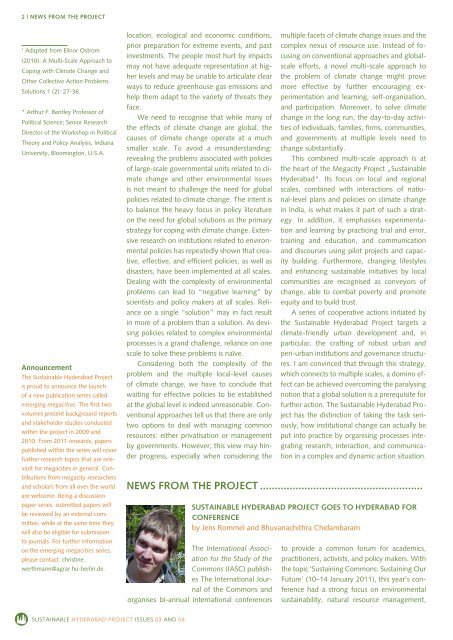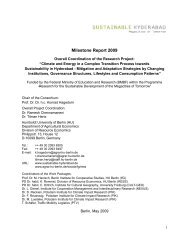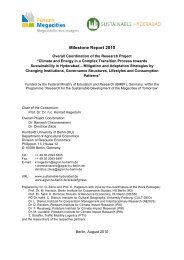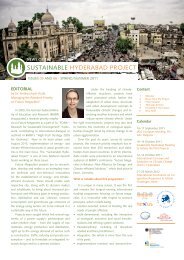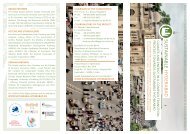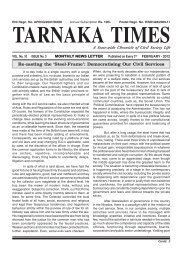SUSTAINABLE HYDERABAD PROJECT
SUSTAINABLE HYDERABAD PROJECT
SUSTAINABLE HYDERABAD PROJECT
You also want an ePaper? Increase the reach of your titles
YUMPU automatically turns print PDFs into web optimized ePapers that Google loves.
2 | NEWS FROM THE <strong>PROJECT</strong>ORIAL<br />
1<br />
Adapted from Elinor Ostrom<br />
(2010): A Multi-Scale Approach to<br />
Coping with Climate Change and<br />
Other Collective Action Problems.<br />
Solutions 1 (2): 27-36.<br />
* Arthur F. Bentley Professor of<br />
Political Science; Senior Research<br />
Director of the Workshop in Political<br />
Theory and Policy Analysis, Indiana<br />
University, Bloomington, U.S.A.<br />
Announcement<br />
The Sustainable Hyderabad Project<br />
is proud to announce the launch<br />
of a new publication series called<br />
emerging megacities. The first two<br />
volumes present background reports<br />
and stakeholder studies conducted<br />
within the project in 2009 and<br />
2010. From 2011 onwards, papers<br />
published within the series will cover<br />
further research topics that are relevant<br />
for megacities in general. Contributions<br />
from megacity researchers<br />
and scholars from all over the world<br />
are welcome. Being a discussion<br />
paper series, submitted papers will<br />
be reviewed by an external committee,<br />
while at the same time they<br />
will also be eligible for submission<br />
to journals. For further information<br />
on the emerging megacities series,<br />
please contact: christine.<br />
werthmann@agrar.hu-berlin.de.<br />
location, ecological and economic conditions,<br />
prior preparation for extreme events, and past<br />
investments. The people most hurt by impacts<br />
may not have adequate representation at higher<br />
levels and may be unable to articulate clear<br />
ways to reduce greenhouse gas emissions and<br />
help them adapt to the variety of threats they<br />
face.<br />
We need to recognise that while many of<br />
the effects of climate change are global, the<br />
causes of climate change operate at a much<br />
smaller scale. To avoid a misunderstanding:<br />
revealing the problems associated with policies<br />
of large-scale governmental units related to climate<br />
change and other environmental issues<br />
is not meant to challenge the need for global<br />
policies related to climate change. The intent is<br />
to balance the heavy focus in policy literature<br />
on the need for global solutions as the primary<br />
strategy for coping with climate change. Extensive<br />
research on institutions related to environmental<br />
policies has repeatedly shown that creative,<br />
effective, and efficient policies, as well as<br />
disasters, have been implemented at all scales.<br />
Dealing with the complexity of environmental<br />
problems can lead to “negative learning” by<br />
scientists and policy makers at all scales. Reliance<br />
on a single “solution” may in fact result<br />
in more of a problem than a solution. As devising<br />
policies related to complex environmental<br />
processes is a grand challenge, reliance on one<br />
scale to solve these problems is naïve.<br />
Considering both the complexity of the<br />
problem and the multiple local-level causes<br />
of climate change, we have to conclude that<br />
waiting for effective policies to be established<br />
at the global level is indeed unreasonable. Conventional<br />
approaches tell us that there are only<br />
two options to deal with managing common<br />
resources: either privatisation or management<br />
by governments. However, this view may hinder<br />
progress, especially when considering the<br />
multiple facets of climate change issues and the<br />
complex nexus of resource use. Instead of focusing<br />
on conventional approaches and globalscale<br />
efforts, a novel multi-scale approach to<br />
the problem of climate change might prove<br />
more effective by further encouraging experimentation<br />
and learning, self-organization,<br />
and participation. Moreover, to solve climate<br />
change in the long run, the day-to-day activities<br />
of individuals, families, firms, communities,<br />
and governments at multiple levels need to<br />
change substantially.<br />
This combined multi-scale approach is at<br />
the heart of the Megacity Project „Sustainable<br />
Hyderabad“. Its focus on local and regional<br />
scales, combined with interactions of national-level<br />
plans and policies on climate change<br />
in India, is what makes it part of such a strategy.<br />
In addition, it emphasises experimentation<br />
and learning by practicing trial and error,<br />
training and education, and communication<br />
and discourses using pilot projects and capacity<br />
building. Furthermore, changing lifestyles<br />
and enhancing sustainable initiatives by local<br />
communities are recognised as conveyors of<br />
change, able to combat poverty and promote<br />
equity and to build trust.<br />
A series of cooperative actions initiated by<br />
the Sustainable Hyderabad Project targets a<br />
climate-friendly urban development and, in<br />
particular, the crafting of robust urban and<br />
peri-urban institutions and governance structures.<br />
I am convinced that through this strategy,<br />
which connects to multiple scales, a domino effect<br />
can be achieved overcoming the paralysing<br />
notion that a global solution is a prerequisite for<br />
further action. The Sustainable Hyderabad Project<br />
has the distinction of taking the task seriously,<br />
how institutional change can actually be<br />
put into practice by organising processes integrating<br />
research, interaction, and communication<br />
in a complex and dynamic action situation.<br />
NEWS FROM THE <strong>PROJECT</strong>........................................................<br />
<strong>SUSTAINABLE</strong> <strong>HYDERABAD</strong> <strong>PROJECT</strong> GOES TO <strong>HYDERABAD</strong> FOR<br />
CONFERENCE<br />
by Jens Rommel and Bhuvanachithra Chidambaram<br />
The International Association<br />
for the Study of the<br />
Commons (IASC) publishes<br />
The International Journal<br />
of the Commons and<br />
organises bi-annual international conferences<br />
to provide a common forum for academics,<br />
practitioners, activists, and policy makers. With<br />
the topic ‘Sustaining Commons: Sustaining Our<br />
Future’ (10–14 January 2011), this year’s conference<br />
had a strong focus on environmental<br />
sustainability, natural resource management,<br />
<strong>SUSTAINABLE</strong> <strong>HYDERABAD</strong> <strong>PROJECT</strong> ISSUES 03 AND 04


